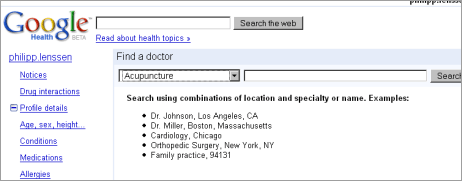Monday, May 19, 2008
Google Factory Tour: Google Health Launched

Today starting at 9:30am Californian time, Google is holding a press event in their Mountain View headquarters lasting until noon (another factory tour was held in 2005). Google announced they will give insights into search, with Google’s R.J. Pittman, Carter Maslan, Johanna Wright, and Marissa Mayer speaking. I’m live-blogging from the webcast.
Google Health launched
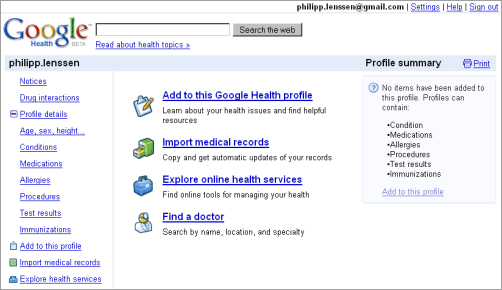
The Google Health site once you’re signed in.
Google Health was put live early on, but only mentioned officially by Marissa Mayer later on during the talks. According to Google, with their new free service you can collect and manage your medical records and health information by building an online profile, and educate yourself about health issues. Google notes the service is currently English and US only (and for users age 18+), though you can access the interface from other countries too.
Last year, Marissa already suggested Google Health will be launched in early 2008. “If you look at health care, there’s already a huge user need, people are already using Google more than any other tool on the Web to find health information ... And the health care industry generates a huge amount of information every year. It’s a natural core competency fo us, to understand how to organize all that data,” she told InformationWeek back then.
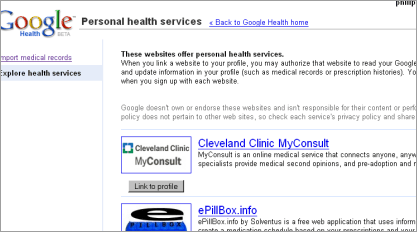
You can import medical records from other services, and explore the list of health services to link to your profile. Google writes, “When you link a website to your profile, you may authorize that website to read your Google Health profile or to automatically send and update information in your profile (such as medical records or prescription histories). You decide which permissions to grant when you sign up with each website.”
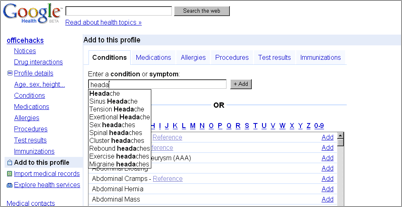
Adding a condition or symptom to your profile. An auto-completion box shows suggestions as you type, or you can pick from one of the items from the list below. Other tabs let you add medications, allergies and more. You can compare this with the screenshots of the Google Health prototype that we posted here in 2007.

Entering your personal data such as your age.
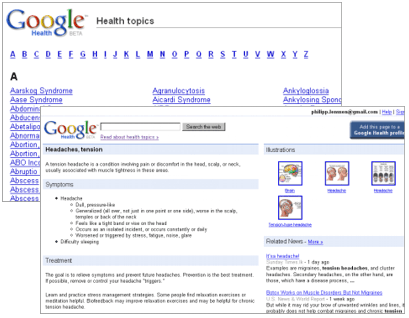
Google Health provides a kind of encyclopedia on health topics, listed in alphabetic order. You can add specific pages, like the one on headache, to your profile. Illustrations can be viewed in a zoomed version in a new window. Related news and groups are shown to the right.
The Google Health terms and policies
The Google Health terms of service, which you need to agree to when you sign up, disclaim:
Google Health does not offer medical advice. Any content accessed through Google Health is for informational purposes only, and is not intended to cover all possible uses, directions, precautions, drug interactions, or adverse effects. This content should not be used during a medical emergency or for the diagnosis or treatment of any medical condition. Please consult your doctor or other qualified health care provider if you have any questions about a medical condition, or before taking any drug, changing your diet or commencing or discontinuing any course of treatment.
Along with Google’s email service Gmail, this new health service stores some of the most private user data imaginable. The Google Health sharing authorization agreement you need to agree to goes into privacy details, stating:
I hereby authorize Google to share the health information contained in my Google Health profile(s) in its entirety, to only those entities and individuals I designate, for the purpose of providing me with medical care and for the purpose of sharing my information with others that I choose.
Google continues to ask for your agreement for them to pass on information about you to entities and individuals you define. As examples, Google lists sensitive information related to e.g. sexually transmitted diseases, mental illness, alcohol abuse, genetic diseases and more.
Google in the Q&A later on explains that they may share aggregate, anonymous information from their Google Health records (a statistic like “10% of users with diabetes got a flu shot”). Greg Sterling from Search Engine Land also asks if Google sees a risk that a company may pressure somebody to e.g. share their Google Health information with them to be able to get a job; without specifically replying to this risk, Marissa says they have privacy policies in place that let you adjust the sharing.
The Google Health privacy policy also says, “Certain features of Google Health can be used in conjunction with other Google products, and those features may share information to provide a better user experience and to improve the quality of our services. For example, Google Health can help you save your doctors’ contact information into your Google Contact List.” As with their other services, Google links in the general privacy policy which says they may share your data to “satisfy any applicable law, regulation, legal process or enforceable governmental request.”
Google image search result ads may be coming
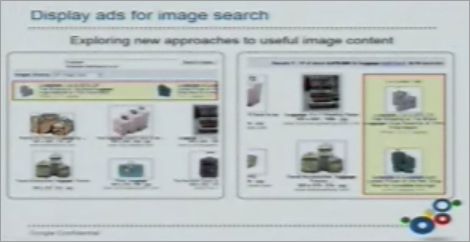
Image ads in Google image search results.
Google announced image ads in image search results may be coming. Google in an email tells me, “This is an experiment that’s currently being run, so only a fraction of users may see this.” In December 2005, Marissa Mayer told John Battelle that “with banner ads we are comfortable saying that they will not appear on the home page and that they will not appear on the result pages” but she specifically named Google image and video search results as a possible exception at the time.
The speakers also talk about image comparison algorithms Google is experimenting with, and how they’re trying to better understand actual image content – like with their existing face recognition technology available via the advanced image search options. Google also says that while Google Labs was pretty quiet recently, it will see new stuff added to it this year.
Search quality is a lot about understanding user intent
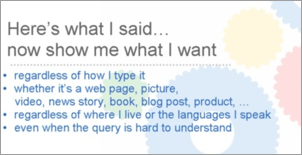
Google gives impressions from the search quality team in another talk. Even when they sometimes may disagree, they all serve one master, Google says; the millions of users. Diversity is important here, and Google offers special oneboxes as part of their “universal search” approach, integrating results from different search services.
Google’s Pandu Nayak gives examples of how it’s easy for humans but tough for computers to understand human intent behind search queries due to ambiguities. What does the “dr” in “dr zhivago” mean, for instance? Easy – it means “Doctor.” But in another search query, it could very well mean “drive” ... or “Dominican Republic.” To be useful, I take it, search results should resolve these ambuigities smartly.
Marissa Mayer later suggests that, if I understand her right, knowing more about the user offers more possibilities for Google to improve search in the future, as it becomes more personalized. “We’re just getting started.” Marissa introduces Google Health with the words, “It is open to the public.”
Google also announced “Go for Good,” a Google-partnered campaign to improve health by walking exercises, accompanied by an iGoogle gadget to set walking targets.
[This post was being edited throughout the event, which is over now. Thanks Tony and all who added comments!]
>> More posts
Advertisement
This site unofficially covers Google™ and more with some rights reserved. Join our forum!

